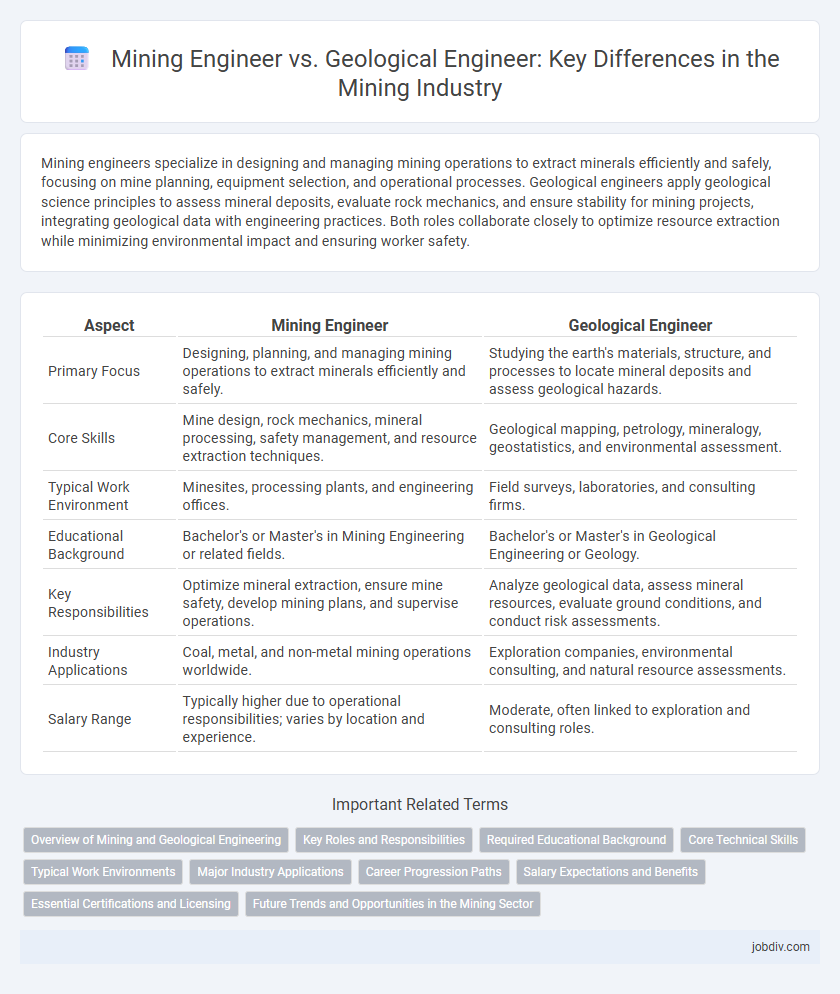Mining engineers specialize in designing and managing mining operations to extract minerals efficiently and safely, focusing on mine planning, equipment selection, and operational processes. Geological engineers apply geological science principles to assess mineral deposits, evaluate rock mechanics, and ensure stability for mining projects, integrating geological data with engineering practices. Both roles collaborate closely to optimize resource extraction while minimizing environmental impact and ensuring worker safety.
Table of Comparison
| Aspect | Mining Engineer | Geological Engineer |
|---|---|---|
| Primary Focus | Designing, planning, and managing mining operations to extract minerals efficiently and safely. | Studying the earth's materials, structure, and processes to locate mineral deposits and assess geological hazards. |
| Core Skills | Mine design, rock mechanics, mineral processing, safety management, and resource extraction techniques. | Geological mapping, petrology, mineralogy, geostatistics, and environmental assessment. |
| Typical Work Environment | Minesites, processing plants, and engineering offices. | Field surveys, laboratories, and consulting firms. |
| Educational Background | Bachelor's or Master's in Mining Engineering or related fields. | Bachelor's or Master's in Geological Engineering or Geology. |
| Key Responsibilities | Optimize mineral extraction, ensure mine safety, develop mining plans, and supervise operations. | Analyze geological data, assess mineral resources, evaluate ground conditions, and conduct risk assessments. |
| Industry Applications | Coal, metal, and non-metal mining operations worldwide. | Exploration companies, environmental consulting, and natural resource assessments. |
| Salary Range | Typically higher due to operational responsibilities; varies by location and experience. | Moderate, often linked to exploration and consulting roles. |
Overview of Mining and Geological Engineering
Mining engineers design and manage the extraction of minerals and resources from the earth, focusing on mine safety, operational efficiency, and environmental compliance. Geological engineers apply geological science principles to assess mineral deposits, analyze ground conditions, and support exploration activities for resource evaluation. Together, these disciplines optimize mining operations by integrating geological data with engineering processes to enhance resource recovery and ensure sustainable development.
Key Roles and Responsibilities
Mining engineers specialize in designing and managing the extraction of minerals from underground and surface mines, focusing on safety, efficiency, and cost-effectiveness in mining operations. Geological engineers concentrate on applying geological science to assess mineral deposits, evaluate environmental impact, and design solutions for ground stability and resource estimation. Both roles require expertise in geotechnical analysis, but mining engineers prioritize operational planning while geological engineers focus on subsurface evaluation and risk assessment.
Required Educational Background
Mining Engineers typically require a bachelor's degree in mining engineering or a closely related field, emphasizing courses in mine design, mineral extraction, and safety management. Geological Engineers generally hold degrees in geological engineering or geology, with a strong foundation in earth sciences, site investigation, and geotechnical analysis. Both fields demand proficiency in mathematics, physics, and computer-aided design software to address industry-specific challenges.
Core Technical Skills
Mining engineers excel in mine design, ventilation systems, and mineral extraction techniques, ensuring efficient and safe operations. Geological engineers specialize in rock mechanics, soil analysis, and geological hazard assessment, providing crucial data for resource evaluation and infrastructure stability. Both roles require proficiency in software tools like AutoCAD, GIS, and modeling programs specific to mining and geology.
Typical Work Environments
Mining engineers typically work in underground mines, surface mining sites, and processing plants where they design and oversee extraction operations, ensuring safety and efficiency. Geological engineers often operate in field settings, conducting site investigations, geological surveys, and soil testing to assess mineral deposits and ground conditions. Both professions frequently collaborate on remote mining projects, combining engineering design with geological analysis to optimize resource extraction.
Major Industry Applications
Mining engineers primarily apply their expertise in the extraction and processing of minerals within industries such as coal, metal ores, and industrial minerals mining. Geological engineers focus on the evaluation and management of earth materials, playing a critical role in sectors like environmental consulting, natural hazard assessment, and infrastructure development. Both disciplines collaborate closely in mining operations to ensure efficient resource extraction while maintaining safety and environmental standards.
Career Progression Paths
Mining engineers typically advance through roles such as mine planning, operations management, and project engineering, eventually reaching senior management or consultancy positions focused on resource extraction efficiency. Geological engineers progress from fieldwork and data analysis to specialized roles in geotechnical engineering, environmental consulting, or exploration management, often moving towards leadership positions in resource evaluation and risk assessment. Both careers offer pathways into technical expertise or strategic leadership, with mining engineers emphasizing operational optimization and geological engineers concentrating on subsurface analysis and environmental impact.
Salary Expectations and Benefits
Mining engineers typically earn an average salary ranging from $70,000 to $120,000 annually, reflecting their role in designing and overseeing mining operations. Geological engineers often have salary expectations between $65,000 and $110,000, with additional benefits tied to fieldwork and environmental assessments. Both professions offer benefits such as health insurance, retirement plans, and opportunities for international assignments in mining hubs like Canada, Australia, and South Africa.
Essential Certifications and Licensing
Mining engineers often require certifications such as the Professional Engineer (PE) license and specific mining safety certifications like MSHA (Mine Safety and Health Administration) to ensure compliance with industry regulations. Geological engineers typically pursue a Professional Geologist (PG) license and may also obtain specialized certifications in geotechnical or environmental geology to validate expertise and enhance career opportunities. Both roles benefit significantly from state-specific licensures and continuing education to maintain credentials and stay updated on evolving mining and environmental standards.
Future Trends and Opportunities in the Mining Sector
Mining engineers are increasingly adopting automation and AI technologies to optimize extraction processes and enhance safety measures, while geological engineers focus on advanced geospatial data analytics and remote sensing for more accurate resource assessment. The mining sector's shift towards sustainable practices creates opportunities for engineers skilled in environmental impact reduction and renewable energy integration within mining operations. Both roles are crucial as the industry moves towards digital transformation and decarbonization, driving demand for expertise in eco-friendly technologies and efficient resource management.
Mining Engineer vs Geological Engineer Infographic

 jobdiv.com
jobdiv.com